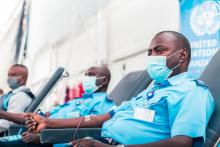Keeping the world beating
Every year, on the 14th of June, countries around the world celebrate World Blood Donor Day. The event serves as a platform to thank voluntary, unpaid blood donors for their life-saving gift of blood. It is also used to raise awareness of the need for regular blood donations to ensure the quality, safety and availability of blood and blood products for patients in need.
This year’s theme is “Give blood and keep the world beating” This theme was coined because fewer people have been donating blood during the COVID-19 pandemic hence stocks of blood are low.
The World Health Organization has been and continues to be concerned by the unequal access globally to blood and blood products. Studies show that of the 112.5 million blood donations units collected globally, approximately half of these are collected in high-income countries, which is home to 19% of the world’s population.
Moreover, over the past year, blood stocks decreased in the African Region as movement restrictions and fears of infection hindered people from accessing donation sites. The average blood donation rate dropped by 17% and the frequency of blood drives reduced by 25%. Demand for blood also decreased by 13% with the suspension of routine surgeries in some countries and fewer people seeking care in health facilities.
However, there are still around seven million patients who require this life-saving product in African countries every year.
Safe blood and its transfusion are key aspects in providing quality care to save mothers haemorrhaging during childbirth and people with serious injuries. Blood is needed for surgical procedures, as well as to treat severe anaemia, inherited blood disorders, and other conditions.
Some people may wonder why blood banks always need blood. First, there are many conditions that make patients need blood transfusion. Second, blood can only be stored for a limited time and so a steady supply of donations is important to make sure adequate blood products are always available.
The Ministry of Health, Community Development, Gender, Elderly and Children has invested over the years to improve Blood Transfusion Services in the country and to ensure compliance with the required international standards.
It is understood that a blood donor programme cannot operate in isolation and requires active collaboration with partner organizations, including community-based organizations, patient associations, professional societies and other stakeholders to meet the nation’s need for blood and blood products at all times.
It is in this context that the WHO Country Office in collaboration with the Resident Coordinator's Office, organized for UN staff and dependants in Dar es Salaam to donate blood as part of commemorating World Blood Donor Day. WHO calls upon everyone to emulate the selfless gesture of blood donors and donate blood to ensure that there is adequate supply in health facilities. WHO commits to continue to support the country implement all appropriate initiatives aimed at improving access to safe blood and blood products to save lives of patients in need.





